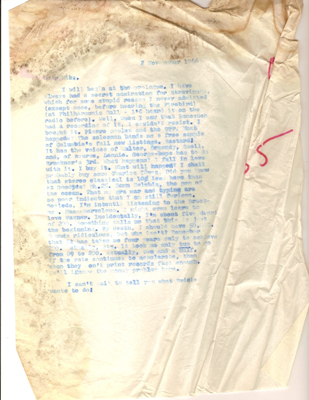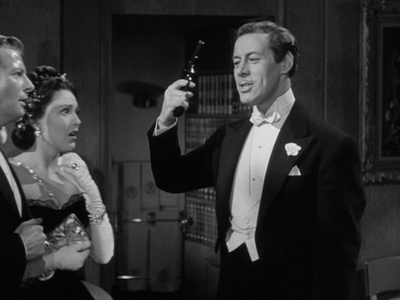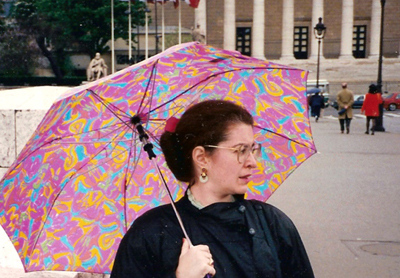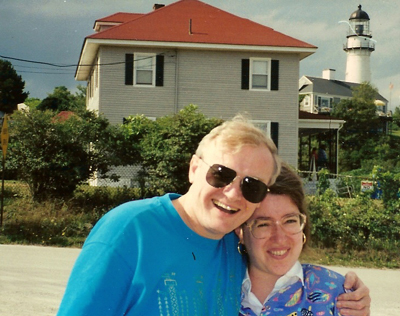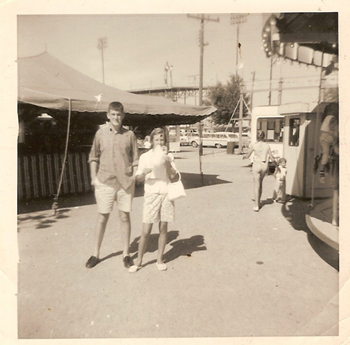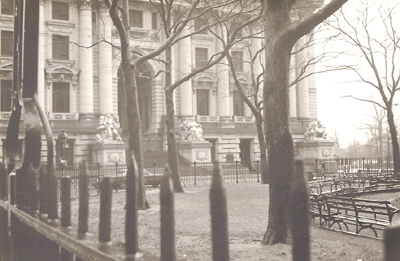
Day Three has been tough. I knew that something would go wrong,
and it did, right away. But it was minor. I left the apartment without gathering
up the keys that open our treasure cave. This hit me as we pulled up the 68th
Street bus stop. We sped back in a taxi and, our virtue having been demonstrated
on the bus already, we took another taxi down to 62nd and York. Experience has
taught me that it's better to walk up the hill there - an appreciable grade when
one is loaded down with junk - than to pull up at the door at the expense of the
terrible traffic jams on I 995 - alias Second Avenue. Toll the bridge!
So it wasn't the logistics that got me down. We were back soon
enough without further mishaps. Removing the last box from what had been two
stacks of twelve was a great relief - we began to envision actually moving out
of the attic. But I had forgotten what the boxes must contain. I'd been through
letters, and I'd been through bills, and even my own feeble fictions. What
remained, therefore, was work.
I have not worked very much in this life of mine.
There were
summer jobs all through high school and college, all of them on Wall Street, all
of them at a predecessor of the Bank of New York, for the matter of that, until
we moved to Houston in 1968 and I varied my experience a bit with gas pipeline
dispatching (a command-center sort of job) and a term in haberdashery at
Sakowitz. Right out of college, I went to the radio station, KLEF, and I kept
that full time job, with ever-increasing responsibilities designed to up my
paltry income, for seven years. Then came law school, and, after that, the only
two jobs that I've had since, first at the New York Stock Exchange and then at E
F Hutton. How many of you remember the catchphrase, "When E F Hutton talks,
people listen." Well, Hutton got into trouble over money laundering (let's hear
it for "the pizza connection"), and the old satirical annual, The Bawl Street
Journal, adjusted the phrase accordingly: "When the Feds speak, E F Hutton
listens." Actually, Hutton didn't listen, not until it was far too late.
I was in the Legal Department, but we had nothing to do with fixing the problem;
that was delegated to outside counsel and, in my opinion, botched to the point
of sabotage. Hutton went under, merging with Shearson, which no longer exists
either, a few months after I quit/was fired. That is, I was told to look for
another job by an unsympathetic general counsel who had been brought in as part
of the "cleanup," but no term was set for my sufferance, and indeed the
announcement that I would leave on such-and-such a day met with a request to
stay on. I did not. All of my colleagues had to apply for their own jobs in the
merger. Hutton had been a jolly place to work, until the money-laundering thing.
I have to say that I liked the job a lot, I liked the people a lot, and I might
even still be there if a bunch of screwups hadn't ruined the party for everyone.
In any case, I have not worked in nearly eighteen years.
Going through the five or six boxes of stuff that I'd kept from
those two jobs, the vast bulk of which I threw away this afternoon, took me back
to a past that, for the most part, I don't miss. It actually frightens me to
consider it. I had such wrong-headed values! I was so stupidly dazzled by
finally having realized the childhood ambition of living in Manhattan! And I
mean, here, to speak of myself as just another kid getting off the bus. I might
have been born here, but I didn't grow up here. I might have had a few more
resources than kids who really do get off the bus, from places much farther away
than Bronxville (which is not in the Bronx), but I was just as unprepared
for the glitz as the deepest rube. In fact, I was more prepared to make
mistakes.
Kathleen and I are still married and still in love, however, and that, in the
end, is all that matters. And how much it matters! I have been inordinately
lucky. But wading through those boxes, I could see just how incredibly lucky I'd
been - because I certainly hadn't helped myself along. I almost got fired from
the Exchange because of absences (they had a weird, complicated, and very strict
policy about sick days), and there were way too many liquid lunches at Hutton. I
had no idea what I was doing or where I was going - it was always clear that
Kathleen would do the going, and indeed she made Wall Street partner the year I
left Hutton - and the contents of the document boxes brought the perplexity of
it all back into sharp focus. Such sharp focus that I had a hard time holding on
to a sense of who I am.
When the last box had been emptied, and the last pile of refuse
tipped down the chute, I was getting very hungry. Kathleen said that we should
go out, but what I wanted was a big bowl of spaghetti alla carbonara.
Kathleen is on record as not caring for this dish, and so I've been making it
for myself for years now on nights when she's working late. I had a feeling that
she might change her mind about it when I served it, and she did. "I always
think that this is going to come in an Alfredo sauce. It is certainly
true that many restaurants douse carbonara with cream; it is likely that
most cooks use whole eggs. But mine is one of the simplest dishes in the world,
and because I keep parsley growing on the balcony, I always have the
ingredients: bacon, eggs, spaghetti, parmeggiano. The sauce is ready
before the pasta water reaches a boil. Tonight, as a variation, mindful of
Kathleen's desire for light food, I used Canadian bacon instead of pancetta
- both of which I stock in the freezer but can slice with my meat slicer.
The egg yolks, the parsley, and a bit of parmeggiano go into a small
processor for blending; the thick slice of bacon is cut into small cubes and
browned in butter, and the spaghetti is boiled for eleven minutes. Then
everything is tossed together. Spaghetti alla carbonara took the edge off
of a very iffy day.


